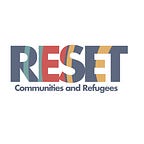Find out the biggest difference between refugee sponsorship in Canada and the UK
Professor Michaela Hynie from York University in Toronto has been studying refugee resettlement in Canada for over a decade. Canadians have privately sponsored more than 300,000 refugees. In this blog Professor Hynie reflects on her observations of the UK’s Community Sponsorship scheme and explains why the UK’s focus on community resettlement over family reunion can represent both a challenge and a strength of the UK model.
I’m Professor Michaela Hynie from York University in Toronto and I’ve been researching refugee resettlement in Canada for more than a decade. Earlier this year, I was invited by Reset and Professor Jenny Phillimore to come to the University of Birmingham to speak to members of Community Sponsorship Groups from across the UK.
This was a chance for me to explain more about Canada’s Privately Sponsored Refugees programme, which has been running for more than 40 years, and to find out about the UK’s Community Sponsorship programme.
In this blog I’ll explain what I saw as the biggest difference between the Canadian and the UK schemes, and why this difference represents both a challenge and a strength for Community Sponsorship in the UK.
The biggest difference between Canada’s Private Sponsorship scheme and the UK’s Community Sponsorship scheme
The biggest difference that I saw between the programmes is that Canada’s Privately Sponsored Refugees programme is, in many respects, a family reunion programme. The vast majority of refugees sponsored to Canada already have family here. They are either being sponsored directly by their family, or by another group of people acting on their family’s behalf. Only a small minority of refugees are sponsored entirely by strangers.
By contrast, in the UK, every refugee that arrives under the Community Sponsorship programme is supported by strangers.
In 2013 Canada began the Blended Visa Office-Referred Programme, which more closely resembles Community Sponsorship in the UK, but only a small proportion of privately sponsored refugees resettled in Canada arrive under this scheme.
Is this a challenge or a strength?
In some ways, the focus in the UK on community resettlement over family reunion makes the task of Community Sponsorship Groups in the UK more challenging. We probably all find the idea of resettling someone we’re related to less daunting than the idea of resettling someone we’ve never met before. And of course, for all kinds of emotional and social reasons, having family in a country already can be positive for refugees when they arrive.
But the reliance on community, rather than family, can also be seen as a strength of the UK’s Community Sponsorship programme. Contrary to what you might expect, in Canada we’ve observed better outcomes for the refugees sponsored by communities than for those sponsored by family members.
When a community decides to sponsor refugees, there is usually a big focus within the sponsorship group on meeting the refugees’ resettlement needs. But when you resettle someone from your own family, you’re not necessarily thinking ‘How do I resettle a new citizen?’ Instead you’re thinking: ‘How can I take care of my family member who’s come to live with me?’ And those are two different things.
The far-reaching impact of resettlement by communities
We’ve also seen that being sponsored by the community provides more opportunities for refugees (and sponsorship group members!) to form relationships with people from lots of different communities.
This is why Community Sponsorship can have such a far-reaching impact on society as a whole. We know that in Canada people who have contact with refugees and migrants generally have more positive attitudes towards immigration — because they know that refugees and migrants are people just like everybody else.
Any programme that increases contact across social divides leads to more cohesive societies.
This doesn’t mean that resettlement by the community is simple or easy. Integration doesn’t happen overnight, or even over a year.
But it does mean that by dedicating time and energy to schemes like Community Sponsorship, it’s possible for you to have a real impact — both on the lives of individual refugee families and on national attitudes towards migration.
Michaela Hynie is a professor at the Centre for Refugee Studies at York University in Toronto. You can view her profile here: http://health.yorku.ca/health-profiles/index.php?mid=12603
Find out more about sponsorship and refugee integration programs in Canada:
Student Refugee Program: https://srp.wusc.ca/
Private Sponsorship of Refugees: https://www.canada.ca/en/immigration-refugees-citizenship/corporate/publications-manuals/guide-private-sponsorship-refugees-program.html
The Together Project: https://togetherproject.ca/
